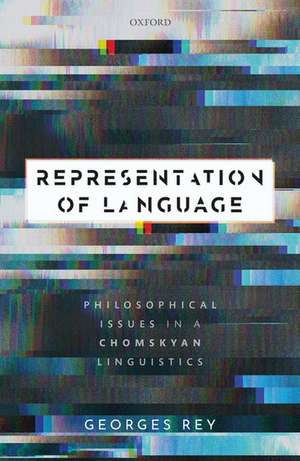Representation of Language: Philosophical Issues in a Chomskyan Linguistics
Autor Georges Reyen Limba Engleză Hardback – 15 oct 2020
Preț: 604.56 lei
Preț vechi: 692.61 lei
-13% Nou
Puncte Express: 907
Preț estimativ în valută:
115.70€ • 125.63$ • 97.18£
115.70€ • 125.63$ • 97.18£
Carte disponibilă
Livrare economică 22-28 martie
Preluare comenzi: 021 569.72.76
Specificații
ISBN-13: 9780198855637
ISBN-10: 019885563X
Pagini: 478
Dimensiuni: 165 x 245 x 30 mm
Greutate: 0.86 kg
Editura: OUP OXFORD
Colecția OUP Oxford
Locul publicării:Oxford, United Kingdom
ISBN-10: 019885563X
Pagini: 478
Dimensiuni: 165 x 245 x 30 mm
Greutate: 0.86 kg
Editura: OUP OXFORD
Colecția OUP Oxford
Locul publicării:Oxford, United Kingdom
Recenzii
Combining philosophy of mind, cognitive psychology, and psycholinguistics, Rey offers a comprehensive, interdisciplinary theory of linguistic competence and its basis in the makeup of the human mind.
This long-awaited book distills years of deep engagement with the most important foundational and philosophical questions raised by linguistics and the cognitive sciences. Overflowing with sharp observations and original ideas, it's a must-read for philosophers and scientists alike interested in innateness, intentionality, computational explanation, and methodology in the mind-brain sciences.
This book is vital reading for anyone interested in Chomsky's revolution in linguistics and what it has meant for our understanding of the human mind. It is both an invaluable guide to the impact of Chomsky's work on philosophy and a very considerable original contribution to the field. It is rigorous (Rey has done his homework on the linguistics thoroughly), fair-minded (to Chomsky and to his critics), and contentious. Rey writes vividly and has a gift for going to the essence of an argument.
Rey's volume is both an excellent introduction to the foundations of generative linguistics and perhaps the most sustained contemporary engagement with the many philosophical nuances of Chomsky's own position. Where Rey agrees with Chomsky, he offers novel considerations in support, and where he disagrees, his points are unfailingly insightful and well-informed. It is an utterly admirable volume, from which the student and the expert have much to learn.
In this book, Georges Rey offers a solid and thought-provoking discussion of a range of foundational issues in Chomskyan linguistics. The book will influence and engage linguists and philosophers alike, hopefully enriching cross-disciplinary conversations in the future.
In this rollicking ride through the philosophy of Chomskian linguistics, Georges Rey argues for the centrality of the notion of representation, and makes a startling proposal for what it is that the claims of linguistic theories represent, and what the wider implications are for psychology more generally. Original, intellectually fun, and, for a linguist, enjoyably contentious, this is a great read
This long-awaited book distills years of deep engagement with the most important foundational and philosophical questions raised by linguistics and the cognitive sciences. Overflowing with sharp observations and original ideas, it's a must-read for philosophers and scientists alike interested in innateness, intentionality, computational explanation, and methodology in the mind-brain sciences.
This book is vital reading for anyone interested in Chomsky's revolution in linguistics and what it has meant for our understanding of the human mind. It is both an invaluable guide to the impact of Chomsky's work on philosophy and a very considerable original contribution to the field. It is rigorous (Rey has done his homework on the linguistics thoroughly), fair-minded (to Chomsky and to his critics), and contentious. Rey writes vividly and has a gift for going to the essence of an argument.
Rey's volume is both an excellent introduction to the foundations of generative linguistics and perhaps the most sustained contemporary engagement with the many philosophical nuances of Chomsky's own position. Where Rey agrees with Chomsky, he offers novel considerations in support, and where he disagrees, his points are unfailingly insightful and well-informed. It is an utterly admirable volume, from which the student and the expert have much to learn.
In this book, Georges Rey offers a solid and thought-provoking discussion of a range of foundational issues in Chomskyan linguistics. The book will influence and engage linguists and philosophers alike, hopefully enriching cross-disciplinary conversations in the future.
In this rollicking ride through the philosophy of Chomskian linguistics, Georges Rey argues for the centrality of the notion of representation, and makes a startling proposal for what it is that the claims of linguistic theories represent, and what the wider implications are for psychology more generally. Original, intellectually fun, and, for a linguist, enjoyably contentious, this is a great read
Notă biografică
Georges Rey is a Professor of Philosophy at the University of Maryland. He works primarily in the philosophy of mind and cognitive science, and has written numerous articles on problems surrounding (ir)rationality, concepts, linguistic competence, qualitative experience and consciousness, as well as a book, Contemporary Philosophy of Mind (Blackwell, 1997), where he defends a computational/representational theory of mind as a strategy for dealing with them.
